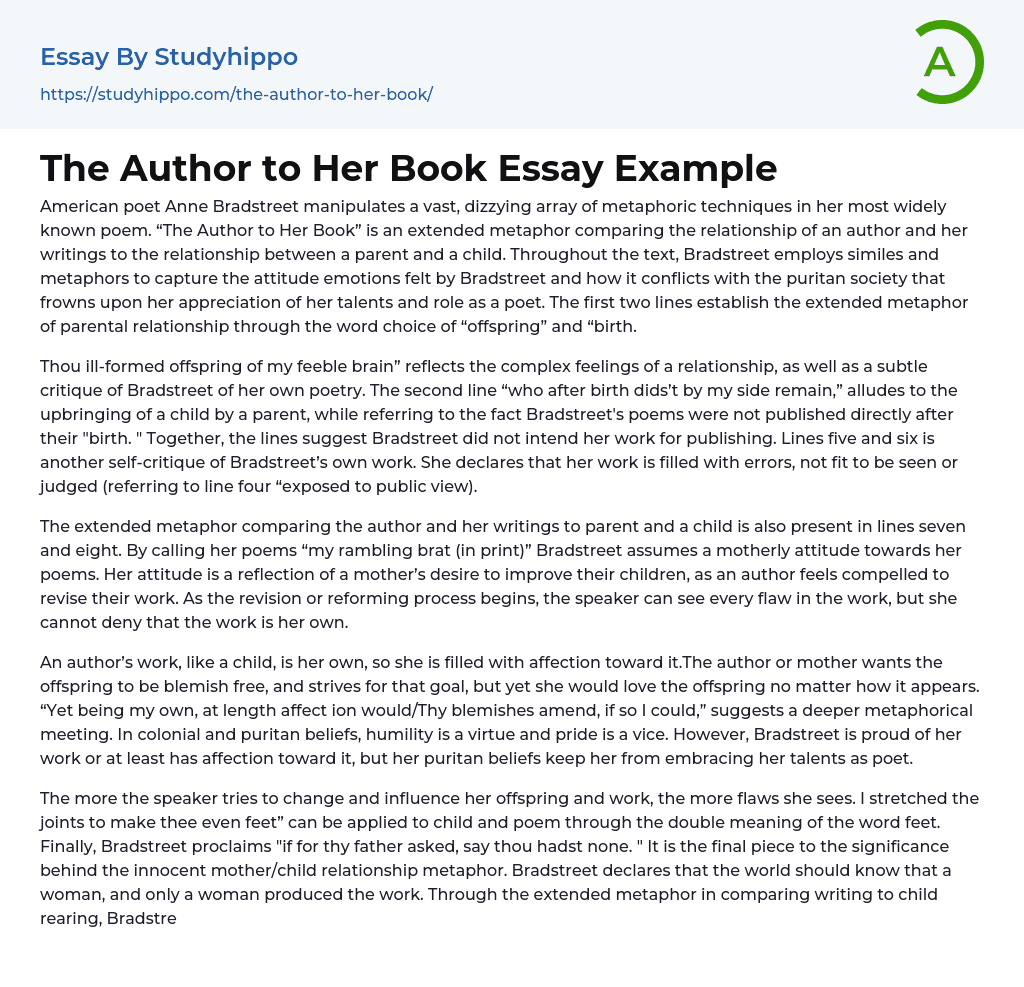American poet Anne Bradstreet manipulates a vast, dizzying array of metaphoric techniques in her most widely known poem. “The Author to Her Book” is an extended metaphor comparing the relationship of an author and her writings to the relationship between a parent and a child. Throughout the text, Bradstreet employs similes and metaphors to capture the attitude emotions felt by Bradstreet and how it conflicts with the puritan society that frowns upon her appreciation of her talents and role as a poet. The first two lines establish the extended metaphor of parental relationship through the word choice of “offspring” and “birth.
Thou ill-formed offspring of my feeble brain” reflects the complex feelings of a relationship, as well as a subtle critique of Bradstreet of her own poetry. The second line “who after birth dids�
...�t by my side remain,” alludes to the upbringing of a child by a parent, while referring to the fact Bradstreet's poems were not published directly after their "birth. " Together, the lines suggest Bradstreet did not intend her work for publishing. Lines five and six is another self-critique of Bradstreet’s own work. She declares that her work is filled with errors, not fit to be seen or judged (referring to line four “exposed to public view).
The extended metaphor comparing the author and her writings to parent and a child is also present in lines seven and eight. By calling her poems “my rambling brat (in print)” Bradstreet assumes a motherly attitude towards her poems. Her attitude is a reflection of a mother’s desire to improve their children, as an author feels compelled to revise their work. As the revision or reformin
process begins, the speaker can see every flaw in the work, but she cannot deny that the work is her own.
An author’s work, like a child, is her own, so she is filled with affection toward it.The author or mother wants the offspring to be blemish free, and strives for that goal, but yet she would love the offspring no matter how it appears. “Yet being my own, at length affect ion would/Thy blemishes amend, if so I could,” suggests a deeper metaphorical meeting. In colonial and puritan beliefs, humility is a virtue and pride is a vice. However, Bradstreet is proud of her work or at least has affection toward it, but her puritan beliefs keep her from embracing her talents as poet.
The more the speaker tries to change and influence her offspring and work, the more flaws she sees. I stretched the joints to make thee even feet” can be applied to child and poem through the double meaning of the word feet. Finally, Bradstreet proclaims "if for thy father asked, say thou hadst none. " It is the final piece to the significance behind the innocent mother/child relationship metaphor. Bradstreet declares that the world should know that a woman, and only a woman produced the work. Through the extended metaphor in comparing writing to child rearing, Bradstreet suggests it is not against Puritan beliefs for a woman to write.
From the extended metaphor techniques employed by Bradstreet, her attitude is revealed, suggesting that poetry is created out of love and emotion, and like a child, poetry cannot be perfected to the creator’s will, as shown in lines 13-26. If being a
poet meant taking on a certain role with a specific task in mind, then where does that leave Bradstreet. Furthermore, the extended metaphor allows Bradstreet to protest the puritan views that writing is improper for a woman by comparing it to childrearing.
- Boo Radley essays
- Genesis essays
- Richard iii essays
- Alice in Wonderland essays
- On the road essays
- Ozymandias essays
- The Nightingale essays
- Holden Caulfield essays
- Animal Farm essays
- 1984 essays
- A Hanging essays
- Shooting An Elephant essays
- A Tale Of Two Cities essays
- Adventures Of Huckleberry Finn essays
- Arthur Conan Doyle essays
- Brave New World essays
- Characters In Hamlet essays
- Characters In Romeo And Juliet essays
- Desdemona essays
- Diary Of A Wimpy Kid essays
- First-Person Narrative essays
- Frankenstein essays
- Heart Of Darkness essays
- Jane Eyre essays
- Jay Gatsby essays
- King Duncan essays
- Librarian essays
- Little Red Riding Hood essays
- Lord Of The Flies essays
- Silas Marner essays
- The Cask Of Amontillado essays
- The Catcher In The Rye essays
- The Crucible essays
- The Handmaid's Tale essays
- The Reader essays
- Virgil essays
- Wuthering Heights essays
- Candide essays
- Castle essays
- J. D. Salinger essays
- Ulysses essays
- Ethan Frome essays
- In Cold Blood essays
- Outliers essays
- Tuesdays With Morrie essays
- The Art of War essays
- Wife of Bath essays
- Huckleberry Finn essays
- The Lady With The Dog essays
- Great Expectations essays




